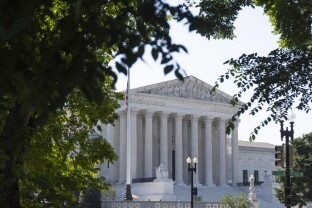Overturning Chevron deference isn’t the end of the road for the conservative legal movement. The next blow for government agencies may be just around the corner, public interest groups warn.
Groups like the nonpartisan American Cancer Society Cancer Action Network and the progressive group Public Citizen shuddered at the court’s ruling Friday, which overturned a 40-year-old precedent and decisively shifted power away from the executive branch and to the court.
“There’s just no room to go backward when it comes to ensuring people have access to screenings and treatment or time to wait for delays in approving cancer-fighting drugs,” Mary Rouvelas, a managing lawyer with the American Cancer Society Cancer Action Network, told NOTUS in a statement. “But that’s exactly what this decision now threatens to do. Any ruling that puts access to health care at risk puts lives at risk.”
